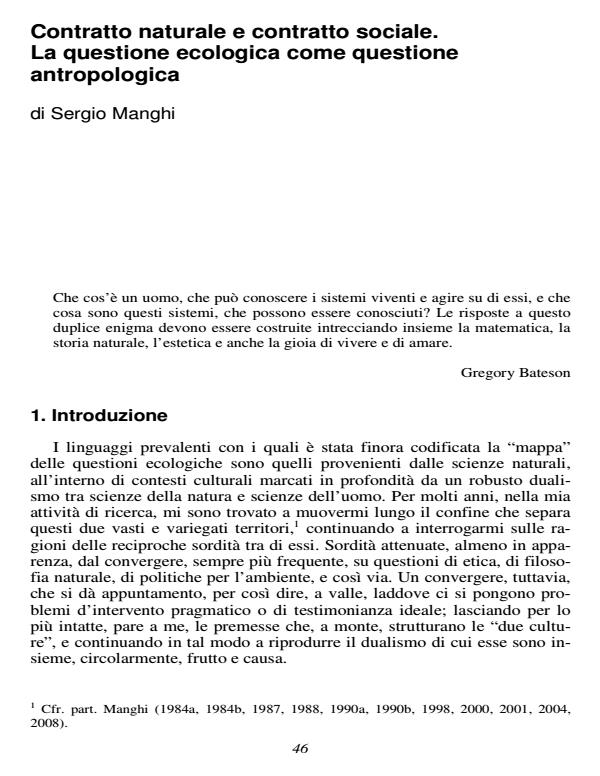Contratto naturale e contratto sociale. La questione ecologica come questione antropologica
Titolo Rivista CULTURE DELLA SOSTENIBILITA '
Autori/Curatori Sergio Manghi
Anno di pubblicazione 2008 Fascicolo 2007/2
Lingua Italiano Numero pagine 13 P. 46-58 Dimensione file 121 KB
DOI
Il DOI è il codice a barre della proprietà intellettuale: per saperne di più
clicca qui
Qui sotto puoi vedere in anteprima la prima pagina di questo articolo.
Se questo articolo ti interessa, lo puoi acquistare (e scaricare in formato pdf) seguendo le facili indicazioni per acquistare il download credit. Acquista Download Credits per scaricare questo Articolo in formato PDF

FrancoAngeli è membro della Publishers International Linking Association, Inc (PILA)associazione indipendente e non profit per facilitare (attraverso i servizi tecnologici implementati da CrossRef.org) l’accesso degli studiosi ai contenuti digitali nelle pubblicazioni professionali e scientifiche
The dualism between Natural and Human Sciences is still persisting. The reason of it consists in the underestimation of the linguistic issues: expressions like fight against pollution, environmental protection, preservation of ecosystems and similar ones do not have unambiguous meanings. For example there is a frontal ecology which assumes some descriptive- explanatory notions which can be summarised through the word environment, and there is a relational ecology which adopts the ecosystemic explanatory principle both in the description of the observed systems and in the description of the relationship between observed and observing systems. From this point of view, the term ecology designates primarily (even though not only that) a general epistemology of living processes with an evolutionistic character. Or, if we prefer, an epistemology of complexity. With regards to social sciences a notion of ecology so meant, detached from the objectivistic-frontal concepts of the environment and the ecosystem, entails the task to contribute to the same definition of what can be meant through terms like environment and ecosystems, that is, to construct new explanatory principles. In other words the ecological issue is a question of communication, first of all, between human beings conceived ab origine as living beings, as entirely bio-socio-cultural animals, embedded in pragmatic, linguistic, communicative and living ecosystems which are larger than them. No Chernobyl could be understood apart from the understanding of Auschwitz. No ecology of the interaction between us and the environment could arise without a dialogue between a naturalistic knowledge and socioanthropological ones able to question and permanently connect their respective languages.
Sergio Manghi, Contratto naturale e contratto sociale. La questione ecologica come questione antropologica in "CULTURE DELLA SOSTENIBILITA '" 2/2007, pp 46-58, DOI: